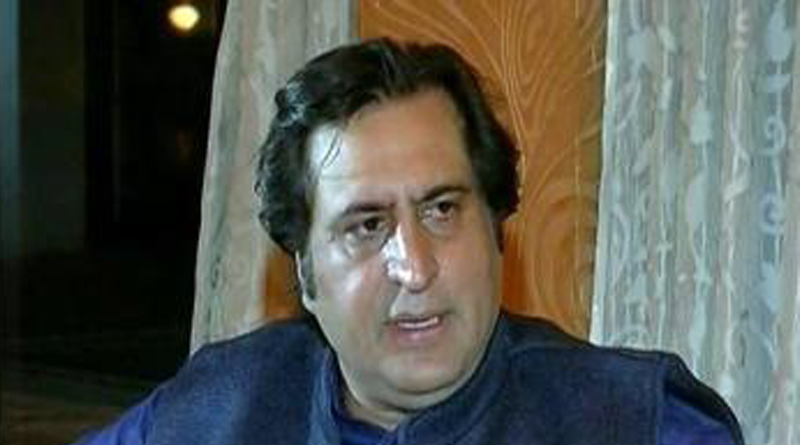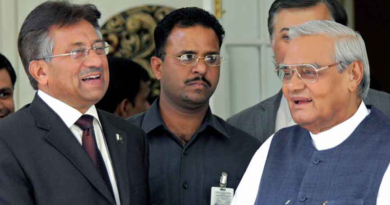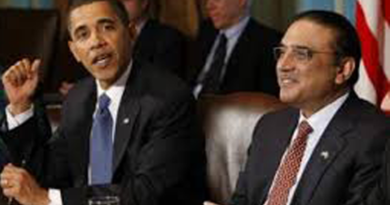Sajjad Lone has Shot Himself in the Foot
Mr Sajjad Ghani Lone of Peoples Conference has now decided to migrate from Freedom politics to Puppet politics by announcing to participate in the Indian held elections. He was absolutely right when he said “I’m too little to deliver a blow to separatism”. In these lines, I am not going to comment on Mr Lone’s decision as such, but would like to make a point of wider relevance, relevant to Mr Omar Abdullah as well, with reference to this decision.
Sajjad Lone, as any independent observer might agree, is a young, energetic, apparently forward-looking, and ambitious Kashmiri politician. I do not resort to use of adjectives for individuals without reason; actually I desist from judgmental thinking in general. The adjectives used above are relevant to the point I wish to make. It is not possible to put across my point in a sentence or two, I will build it up as the discussion proceeds.
To start with, let us note that the Mr Lone is, what I call a ‘legacy inheritor’. He, is not the creator or author of the political philosophy and vision of Peoples Conference, he inherited it as a legacy. This is nothing unusual, this happens every time, everywhere, but it puts some demands on the inheritor: he/she has to manage the legacy to make it suit to the times in which he/she finds himself/herself politically operating. If that is not done, or could not be, then a forward movement in real time is not possible. The legacy bearing political platform and the individuals associated with it lose their relevance, and are ultimately assigned to the dustbin of history.
Sajjad Lone and Omar Abdullah are headed to same destiny, unless they critically look at the legacy they have inherited, and do what is naturally necessary to move into the future. Without going into theoretical details, which a proper treatment of the subject would otherwise entail, the point under discussion may well be illustrated by picking up an example from recent British politics, more specifically, from British Labour Party. Labour Party in Britain is historically the political culmination of the Labour movement inspired by Marxist ideals. As such, this party used to be identified with socialism. But since England has been historically the birth place of modern day Capitalism, it was not easy for a socialist political party to successfully conduct its politics and remain in power. When the party was defeated in 1979 by Conservatives, and Mrs Margret Thatcher presided over a regime a free market economy for 11 long years, the Labour was almost sent into oblivion, it was nicknamed ‘socialist’ and the party of Trade Unions. The Soviet Union had also broken up in the meantime. It was only in 1994 when Tony Blair took over as Party Leader, that Labour Party began to redefine itself as, what it called, ‘New Labour’. As a result of this, the party won a landslide in 1997, and continues to be in power since then. Now let us see what had happened here: Tony Blair joined a party which carried an ideological legacy. In order to succeed, Mr Blair had to do something that would create a proper connect between the ideology of his party, which he inherited as legacy, and the world of reality around him. He updated the legacy, saying that Labour Party had confused values of socialism with its means. For example, Nationalisation of various industries, as was pursued by previous Labour governments, was not an end but a means, and so, as was argued, new and popularly acceptable means should be employed to achieve the desired ends. The New Labour would pursue socialist values with emphasis on social agenda like health, education, employment, environment and climate. This was a new strategy of survival and growth, not only for British Labour, but for most of the Centre-left parties in Europe and also United States. In nutshell, it was a considered but unannounced decision by Tony Blair, Bill Clinton of USA, and their likes elsewhere to pursue social radicalism in place of economic radicalism.
The British example tells us that inheriting a legacy is not a problem as such, it does not act as a handicap for moving on to the future because the legacy can be updated in order to establish its relevance and make it responsive to the needs of the time. However the essential prerequisite is that the element we are seeking to update should have had some substance in the first place. If it then loses relevance at any point in time, it can be re-articulated in a new idiom, and redefined with new meanings. But if something is originally empty and devoid of any genuine content and meaning, how can that be updated or redefined? As we talked about ‘New Labour’ a while ago, we must not lose sight of the fact that Tony Blair could redefine or rearticulate the legacy elements only, and only, when there was some content, meaning and substance in those elements. They might have lost their relevance, but not the meaning. The socialist ideals of the Labour party owed their origin to the real tyrannical and exploitative conditions that the English working classes were subjected to in the 19th century. As such, these were genuine ideals and not a figment of imagination or a fictitious construct to serve a pre-conceived objective. One would agree or disagree with the content of those ideals, that is not our concern here, what concerns us instead is whether there was some substance in those ideals or not. The answer is yes, there was, and only then they could be redefined according to the demands of the time. Let us now revert back to Kashmir, and see if the legacy inheritors can update the legacy or not. The first thing to note in this regard is that in any political vision, the question of the political status of Kashmir is a key element, and it is this element that defines the whole package, the party, its leaders, its ideology, agenda and everything else. On this question, i.e. question of the political status of Kashmir, there are not many positions a party can have: It can either regard the so-called accession of Kashmir to India final, or may dispute/reject it, there is no third position. This means that in any legacy that is inherited, the key element is the position on Kashmir’s political status, and, consequently, when it comes to updating the legacy and making it responsive to existing world of realities, this element would need to be updated. This poses an unsurmountable problem for pro-India politics in Kashmir which essentially gets frozen and immobilised in real time because the legacy cannot be updated. The pro-accession (accession to India. This will be the meaning wherever we use ‘pro-accession’) stand that forms the core of legacy, had never any substance so cannot be redefined or refreshed. That effectively puts a huge bar on the forward movement of pro-India politics, and seals the future of the people associated with it. They may have energies and ambition as Sajjad Lone, or for that matter, Omar Abdullah has, but once they opt for the pro-India platform, as they have, the process of their turning dwarf with each passing moment starts, and that is the intrinsic characteristic of this platform. It generates rubbish for the dustbin of Kashmir history.
We need to dwell more into the question of why pro-accession legacy is so stale, and cannot be updated. Actually, Kashmir’s so-called accession to India is something that has just happened, it is not a stand, a party position backed by any sort of logic or consideration. It happened as do natural disasters, with the obvious difference that there were human hands involved in it. Not only now, never in the past 60 years has there been an argument for Kashmir’s accession to India seriously deployed and then won, and neither have people accepted it right from 1947. It was imposed then, continues to be imposed now, and can withstand neither the test of democracy nor that of reason. Everyone knows, but it can be investigated by an independent commission, that when people participated in India-held elections in the past 60 years, or they followed the late Shiekh Mohammad Abdullah regarding him as their leader, what exactly they were expressing. Everyone knew from Delhi to Kashmir, and so did the late Shiekh, that people’s vote for National conference, and/or other pro-India parties(whatever the fairness of elections, howsoever little the turnout) was not a vote for Kashmir’s accession to India, nor did the fact that people followed Shiekh as leader amount to their approval of accession to India. That is the reason why India always, and later the late Shiekh as well, opposed holding of plebiscite. The pro-accession leaders have at times tried to bring in ideology saying there were genuine ideological considerations involved in seeking accession to India, namely, the fact that India was emerging as secular democracy with anti-imperialistic politico-economic orientation. It is not important if the late Shiekh Abdullah and his mates had any ideological considerations is not, for the sake of argument let us accept they had, but what counts now is how right they were in having those considerations. As it became clear soon after India’s independence, their reading of Indian situation was pathetically wrong. The pro-accession camp was hugely upset when Indian National Congress showed considerable resentment over the land reforms in Kashmir undertaken under Naya Kashmir program, and again, they could see the Indian ‘democracy’ in true colours when Shiekh Abdullah was arrested in 1953. So, the argument that accession to India had ideological considerations behind it, had lost its relevance long ago, and the founder-leaders of pro-accession politics themselves, had found it unsustainable. The current inheritors of the pro-accession legacy are in far more difficult situation. Invoking ideology to support pro-accession position is far too difficult for them. India has established itself as an enthusiastic player in the global world order that is explicitly tilted against Islam and Muslims. The values of Non-violence, and Hindu-Muslim-Sikh itehad that the founding leaders of pro-accession politics used to attribute to India, albeit wrongly, are no more available for a similar use to the inheritors of pro-accession legacy. India’s smallness to accommodate any universal moral values has very clearly surfaced, as has its commitment to the religion of money under the American tutelage. So those who inherit the pro-accession legacy now are miserably deprived, the total emptiness of this legacy has so clearly surfaced that the use of any ideological argument, as their ancestors sometimes used to do, will fly in the face of facts.
The founder-leaders of pro-accession politics would sometimes resort to the argument of ‘majboori’ helplessness to explain why they chose to seek accession to India. The late Mir Qasim, a founder-leader, and ex chief minister of Jammu and Kashmir, writes in his autobiography that the then prevailing situation created by what he calls the invaders from Pakistan forced them to seek accession to India, otherwise Shiekh Abdullah had an open mind, till as late as September 1947, about who to accede to, India or Pakistan. For the sake of argument, let us take Mir Qasim on his word, but it cannot count as a reason. The destiny of a people is not determined by the compulsions of a situation, which anyway, keeps changing. The inheritors of pro-accession legacy are once again deprived here: if they cite this argument they are undermining the platform on which they are operating.
Commonsense would say that if, as the pro-accession argument goes,60 years ago winds of the time pushed us to choose a political destiny, should we have been trying to change that or perpetuate, particularly when this decision has cost us everything that we hold dear. It is like a person, who when chased by a mad dog takes refuge in a toilet. The pro-accession politics seeks to keep us locked in the toilet for ever while promising to launch big developmental programs to ensure that we regard it a best place to live, and never try to come out. That is what Omar Abdullah is doing, and that is what Sajjad lone’s decision to participate in the elections effectively means. From what we have been saying in the preceding lines, one thing should be clear about the pro-accession legacy that not only is it stale and without substance, it does not provide an inch of ground to the inheritors to fix their feet on. They can not say a single sensible thing in defence of their pro-accession stand. This could perhaps be the reason why Omar Abdullah started disconnecting Kashmir issue from elections. Obviously if he speaks in favour of accession(his official position on Kashmir) there will not be anyone to listen to him, let alone vote for him, and if he is asking for a vote he better not say anything about which there is nothing sensible to say. But this is a trick, and is not going to work for long. Sajjad Lone is seemingly following the same track, as if he too is planning tricks. When he announced his decision to contest parliamentary polls, that was enough, because it was speaking volumes by itself. However, he went on talking about strategy, representation, and reorientation etc. etc. and that was sounding a bit tricky.
As I see it, Sajjad Lone has worked against his political future. He could have made a difference, and done some politics in real terms if he had continued to be part of the anti-accession or freedom politics. APHCs have come to represent it, but it is definitely far wider and profound than those formal structures. It is the cause of Truth and Justice in Kashmir.
***
Dr. Syed M Inayatullah Andrabi is a well-known figure in the circles of political Islam. Born in Srinagar, the capital city of Indian Held Kashmir, Dr Andrabi has been intimately involved at the intellectual level with the global politics and political issues since his student days in 1980 at Pune (India), where he completed his Ph.D. in Linguistics in 1983 at the Centre of Advanced Study in Linguistics, Deccan College, University of Pune, Pune, India. Upon completing his doctorate he returned home to join the University of Kashmir, first on a post-doctoral fellowship and later as faculty, but could not continue because of the deteriorating security situation in Kashmir, and had to move to United Kingdom in 1994 where he continues to live since along with his wife and five children.




